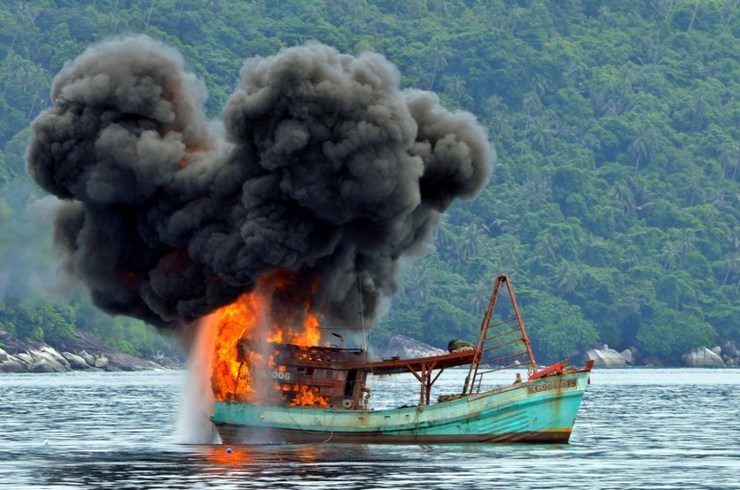SUMMARY
This is AI generated summarization, which may have errors. For context, always refer to the full article.

The news that Indonesian authorities sank three Vietnamese fishing boats in Indonesian waters last week puts new teeth into President Joko Widodo’s vow, enunciated at his Inaugural address and again in mid-November, that he intends to make his nation into a regional maritime power.
On Friday, officials sank three Vietnamese vessels captured for fishing illegally in Indonesia’s waters, which some observers have construed as a message to China, which has made unprecedented intrusions into Indonesian waters around the Natuna Islands and which on Monday, December 8, reiterated its right to South China Sea areas also claimed by the Philippines.
Coordinating Political, Legal and Security Affairs Minister Tedjo Edhy Purdijatno told reporters that they intended to demonstrate “stern government action” against illegal fishing. Another 5 Thai vessels have been held since No. 2 after being captured near West Kalimantan and, authorities said, they would also be sent to the bottom. More than 150 small craft are also in Indonesian custody.
The question is what happens when this muscular new maritime policy runs up against China’s own maritime aims
The new president has complained that Indonesia loses as much as IDR300 trillion ($24.2 billion) annually from illegal fishing and currently as many as 5,400 ships operate illegally in territorial waters because the government has taken little action to stop them. That isn’t quite true. In the five years between 2007 and 2012, authorities confiscated and sank 33 of 38 illegal fishing craft, the majority from Vietnam, in waters near the Natuna Islands. It has also conducted territorial standoffs with Malaysian naval vessels.
In major speeches in China and Myanmar, Jokowi, as he prefers to be known, unveiled a major diplomatic agenda outlining what he called a “maritime axis” and serving notice that Indonesia would raise its profile in the South China Sea. He first alluded to plans to turn his country into a maritime nation during his 5-year term of office in his inaugural address in October.
He expanded on that message on November 13 at the East Asia Summit in Myanmar when he said the sea will have an increasingly important role in Indonesia’s future. In short, he said Indonesia intends to become a force between the Indian and Pacific Oceans. In a brief 5-minute address, Jokowi said Indonesia must protect its own archipelago of 18,200 islands, only 8,800 of them even named, in a sea of 8.8 million sq.km.
His Maritime Axis doctrine, he said, rests on 5 pillars that include ensuring regional security as well as safeguarding navigational safety and maritime security, a regional role that the US has played since World War II. One of those pillars, he said, is “maintaining and managing its sea resources and establishing sovereignty over sea-based food products, which currently are poached almost with impunity by international fishing interests.”
The question is what happens when this muscular new maritime policy runs up against China’s own maritime aims, let alone the hundreds of ships plying Indonesian waters from Thailand, Vietnam and the Philippines. According to a Spring 2014 article in Washington Monthly by Alan Dupont and Christopher G. Baker, “Chinese fishing boats are also appearing in unprecedented numbers around Indonesia’s Natuna Island group,” nearly 2,000 km from the Chinese mainland, illustrating how far south the Chinese fleet is now sailing and the extent of its fishing and territorial claims.
Continue reading “Jokowi’s tough new maritime policy takes shape” on Asia Sentinel.
Add a comment
How does this make you feel?
There are no comments yet. Add your comment to start the conversation.